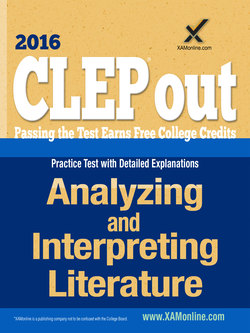Читать книгу CLEP Analyzing and Interpreting Literature - Sharon A Wynne - Страница 4
CLEP Practice Exam: Analyzing and Interpreting Literature
ОглавлениеINSTRUCTIONS
This exam gives passages from known writings (fiction, poems, non-fiction/history, biographies, drama and more) over the past five hundred years. While the student taking the exam is not expected to have read the material or have familiarity with the passage prior to the exam, the test taker is expected to have the knowledge of an undergraduate English and writing class.
TIP: As the writing changes and the time periods change, it’s important for a student to note the author and time period as that may assist in answering questions by either eliminating unlikely answers or allow the student to recall items about the author.
At the end of the test passages and answers, there is an answer key and a “rationale” key for each question. Take the test without referencing these guides. For questions that you guess the answers or get wrong, the rationale is provided to help you see how test makers frame answers to questions or explain pieces of information with which you are unfamiliar.
There are 80 questions on this particular practice test, and the CLEP also uses around 80 for the credit exam. As with the CLEP exam, the passages are taken primarily from American and British Literature - though at least once question, just as in the actual exam, is taken from another area of literature. Within the questions of the CLEP, the mixture of genre types falls typically almost 80-90% between poetry and prose (both fiction and non-fiction within the prose selections) and the remaining on drama. The entire test is balanced between three main eras - Renaissance/17th Century, 18th/19th Century, as well as 10th/21st Century; in the past, there is a slightly heavier emphasis on 18th/19th work, and usually there is one passage from the Classical/pre-Renaissance period.
The CLEP allows 98 minutes to take the exam of approximately 80 questions. Time yourself during the exam, but as you practice, focus more attention on accurately answering questions as the total number of correct answers impacts your score, not how many you skip or get wrong. If you skip any questions, make sure that you also skip that line on the answer sheet - or you may spend a lot of time erasing and redoing your answer key.
These passages do not actually appear on the CLEP exam, but are meant to show how the exam is written and the various range of questions, answers, and key knowledge points required in order to pass the CLEP exam. Read each question carefully and provide the best answer choice. Good luck.
